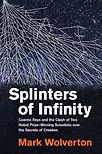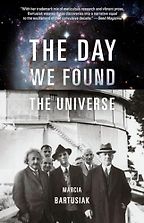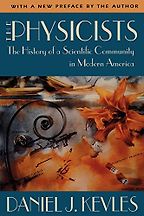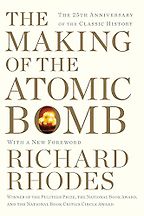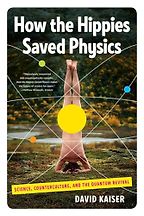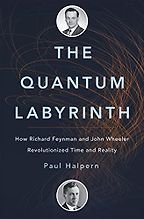We’re looking at the 20th-century history of physics—with a US focus. Before we get to the books you’re recommending, how did you get interested in this stuff, as a writer?
I’ve always been interested in science, ever since I was a little kid. Originally it came from science fiction, watching those old movies. One of the first things that I was really into was Thunderbirds. That was a big influence on me in my early, tender years. Then I started getting more into the science of it and reading people like Isaac Asimov and Arthur C. Clarke. Had I been better at math, I probably would have become a scientist.
But I seemed to have this affinity for writing and putting words together. I started out writing science fiction and other kinds of fiction. Then, at one point, I thought, ‘This isn’t really going anywhere. I have this one talent of writing—what else can I do with it?’ And I thought, ‘Science writing is a good thing. There is definitely a need for it and I have this interest in it.’ So it seemed like a good fit.
That’s when I started really concentrating on nonfiction writing and specifically science. I’ve done all kinds of science writing, but for my books I seem to always concentrate on physics and history, because I have a strong interest in history as well. It’s all these different things coming together.
Physics always seems like the hardest subject—but you seem very confident explaining it in your book. Do you spend a lot of time trying to understand what exactly is going on and trying to convey it in a way that non-specialists can understand?
Yes, and often when I’m writing something—not just in the books, but in articles and so forth—I feel overwhelmed. I think, ‘I don’t understand any of this. What made me think I could do this?’ But then somehow I find a path through: by talking to experts and the scientists actually doing it. I wouldn’t say I’m confident, but sometimes a scientist will come back to me and say, ‘Wow, this is really good. Nobody explained my work this well before.’
I think part of it is that I’m not a scientist. I’m coming at it with a sort of naivete or innocence. I don’t take anything as given. And if I understand it myself, I can explain it to somebody else. So that’s basically what I do.
Let’s go through the books. The first one you chose is The Day We Found the Universe by Marcia Bartusiak. Great title! What’s the book about?
This book covers a lot of ground. It’s about early 20th-century astronomy, mostly in America, and Edwin Hubble and how he discovered the expanding universe. She also traces everything leading up to that discovery.
There was a big debate in the 1920s about whether galaxies were just nebulae, and part of our own galaxy, or if they were actually completely separate, which is what they turned out to be. She describes this in her book, and I also mention it mine. There was a ‘Great Debate,’ as they called it, between Harlow Shapley and Heber Curtis about this issue. It was like a softer, less hostile version of the debate that I describe in my book.
“I’m very drawn to books with strong narratives and strong characters”
The thing that I like about this book is that she really humanizes all the scientists, and the research too. By doing that, she provides a fascinating insight into how the scientific process works. She shows how pioneering it all was at the time, because they just had basic tools. They had telescopes and spectrographs, but nowhere near what we have now. The fact that they were able to gather so much information and come to all these conclusions is a fascinating story.
I love her writing, too. There’s a very humanistic quality to it, I would say. There’s a humor to it. It’s not dry at all. You always get the feeling she’s talking about real people who have real problems like the rest of us and yet they persevered and accomplished these amazing things.
When you read a book sometimes, you think, ‘Wow, this is so good. I wish I’d written it.’ I had that feeling with this book. I knew I couldn’t write something as good, but at least I could try. The stories are different in a lot of ways, but it was an inspiration for Splinters of Infinity.
So your book is subtitled “Cosmic Rays and the Clash of Two Nobel Prize–Winning Scientists over the Secrets of Creation.” How did you settle on cosmic rays as the subject of your book? Was it about the fight between the scientists or an interest in cosmic rays as a phenomenon?
A bit of both. Originally, I had the idea of doing a book on cosmic rays in general, and the history of cosmic ray research, which is a big subject. It’s been going on for over a century and is still ongoing. But I realized that was going to be a huge project that was going to take a long time. Then the pandemic hit, and everything closed down. I thought, ‘Well, if I’m going to do this, I need to scale it down somewhat.’ And the conflict between Robert Millikan (1868–1953) and Arthur Compton (1892–1962) turned out to be the perfect way into the subject.
Just the idea of cosmic rays had a sort of romance and wonder to it. These mysterious things coming from outer space. A century ago, people were wondering, ‘What are these things?’ In many ways, it’s like the way we think about dark matter or dark energy now. We know there’s something there. We don’t quite understand it, but we know that it’s very important. That’s what cosmic rays were 100 years ago.
For those of us who don’t know, can you explain what a cosmic ray is?
A cosmic ray is basically a high energy particle coming from space. The term cosmic ray is really a misnomer because it implies it’s like a ray of light. This was the core of the argument between Millikan and Compton. Are they rays like photons or light, just energy waves? Or are they actually subatomic particles? They turned out to be particles, which—not to give any spoilers—was Compton’s argument.
But when they were first discovered and publicized ‘cosmic ray’ was the term that somebody came up with. It’s been credited to Robert Millikan but other people say, ‘No, Millikan didn’t come up with that word, he was just the first one to really use it widely.’ Whoever coined it, it’s stuck all this time.
They’re particles that are always coming in from all different directions and are passing through your body right now. They’re very high energy, but most of the time they don’t do anything. Once in a while they’ll flip a byte inside a chip in your computer, causing glitches. But that’s rare.
We still don’t know exactly where they all come from. Which is another thing that drew me to this subject because after all this time, it’s still a mystery. At that time (not so much now), they were really thought to be the key to everything: ‘If we can figure this out, we will know the origins of the universe and its ultimate fate!’ There’s something to that, but it’s a lot more complicated, as we now know.
I liked the opening of your book, where there’s a physics conference in Italy and one of the physicists attending, Wolfgang Pauli, complains to a friend about having to shake hands with Benito Mussolini. It’s a reminder how important the Italian physicists were.
I debated whether to start with that. I wanted something to get my readers into this and also to show the importance of the international nature of science, and how that can be deeply affected by other things going on, like the politics.
I also thought that line that Pauli wrote in his letter—’Oh, my God, I had to shake hands with this guy’—was kind of funny.
Is politics—in particular World I and World War II and the Nazis—the reason the center of gravity of physics moved to the United States?
It was a big factor. World War One disrupted a lot of the relationships between scientists. The ideal is that science is a universal thing and doesn’t pay attention to national boundaries. Of course, it doesn’t work that way. From right after the war through the 1920s the Germans were kind of ostracized. Some of them had done war research, but it affected even those physicists who had nothing to do with it.
The US also started to have scientists like Millikan and Compton, who were prominent, did important work, and won Nobel prizes. But Europe was still very important, because of quantum physics. You had Einstein, Niels Bohr and all those folks.
I think it was in the 1930s that things really began to shift to the United States. We had the Great Depression, but we were still relatively unscathed from the war. We didn’t have Hitler or Mussolini. This is one of the reasons I liked The Physicists, which goes into a lot of detail on this.
Yes, let’s move on to that book now: The Physicists: The History of a Scientific Community in Modern America (1977) by Daniel Kevles. Tell me more.
It’s a history book—by a physicist who shifted to doing history. It goes from the early 19th century up to the present (when it was published). It covers how the world wars, especially World War One, affected scientific research and looks at why the centre, especially of experimental physics, shifted to the United States.
The book traces all the different threads—social, political, and, of course, scientific—of how physics went from being an outré subject in the 19th century, with only a few fairly eccentric people doing it, to people like James Maxwell, who were really getting into the nuts and bolts of things. Then, in the 20th century, it started getting a lot of support from people like Rockefeller, who were funding research.
Now, of course, scientific research is largely funded by governments—the National Science Foundation, and so forth. But 100 years ago, the government was not involved at all in it. There was actually a lot of controversy about whether the government should be involved in funding scientific research. The book traces that but also just the whole social phenomena that were going on.
It’s very engagingly written, it’s very entertaining. You would think it would be a fairly dry book, it could even be an academic book, but it’s not at all, it’s very readable. I learned a lot from it that I did not know before, about the background of physics in America. And just science in America too.
Let’s go on to your next book, The Making of the Atomic Bomb, by Richard Rhodes.
This is, of course, the gold standard for that story. It won a Pulitzer Prize, a National Book Award and a whole bunch of other awards. And even though it was published in 1986, it still holds up. I’ve written a lot about nuclear weapons and atomic bombs, so I’ve read basically every book that’s available on it—from the earliest postwar stuff to the present—and Rhodes is just the master at putting it all together. He tells the entire story, from its very beginnings in quantum physics in the early 20th century, and even before that, and how it developed into the atomic bomb. All the figures are in there, all the important physicists.
He’s also masterful at explaining the science. He’s something of a role model in that for me, because he’s not a scientist either, but he talked to enough people. And because he was doing this in the late 1970s and early 1980s, a lot of the people who worked on the Manhattan Project were still around for him to interview and talk to. That’s really important. When I was writing my Oppenheimer book ten years ago, most of the folks that were involved had passed away.
Rhodes also writes with a keen awareness of not just the science, not just the human element, but also why this was such a monumental event in human history and something that touches all of us even to this day. If you’re going to read one book on the atomic bomb, that’s the book to read.
Let’s move on to How the Hippies Saved Physics: Science, Counterculture, and the Quantum Revival.
This is by David Kaiser, who is a physicist. When I was on my fellowship at MIT a few years ago, I took his course on the history of 20th-century physics, which was right up my alley. He’s a great teacher, very entertaining.
That comes through in this book, because he takes something that you don’t think would have anything to do with physics—the 60s, hippies and all these fringe movements in California—and shows how, by the 1960s, physics had become hidebound. It was stuck intellectually in some ways. They would just say, ‘Don’t worry about why this works, don’t ask any questions, just shut up and calculate.’ But there was this group of physicists, mostly in California, who had these unconventional ways of looking at things, especially quantum physics. This unconventional approach really led to some breakthroughs in theoretical physics that we’re still exploring.
David Kaiser is of that generation himself, so he’s very tuned in to the cultural and social aspects. It’s a very entertaining read and he explains everything quite well. It’s a great book.
Lastly, you’ve picked The Quantum Labyrinth (2017) by Paul Halpern which is about Richard Feynman and John Wheeler and how they ‘revolutionized time and reality.’
This is one of those cases where I had to narrow it down because Paul Halpern has written a lot of great books about physics and the history of physics. He’s a physicist himself. This is one I really liked, and one of his more recent books.
It’s taking two figures who were very different in a lot of ways, but came together intellectually, and really complemented each other as scientists. There’s a strong narrative to the book too. I’m very drawn to books with strong narratives and strong characters. I think that’s because I started out as a fiction writer. In my own books, I always try to tell a story.
Feynman himself was a fascinating character. And so was Wheeler. He really shows how they both just came together to—as the subtitle says—revolutionize time and reality.
Feynman is one of these people you always see quoted on Twitter. He seems to be regarded as font of wisdom.
They’re not always real quotes, like Einstein. Einstein, I think, has more quotes and more memes attributed to him than anyone else and a lot of them are things that he never actually said.
It’s funny that we choose to attribute wisdom to physicists. It’s like we feel that they must have the answer to the universe.
Yes, they seem to be tied into the truth somehow. They’re oracles or modern-day priests that tell us the mysteries of God or something.
Five Books aims to keep its book recommendations and interviews up to date. If you are the interviewee and would like to update your choice of books (or even just what you say about them) please email us at [email protected]
Five Books interviews are expensive to produce. If you've enjoyed this interview, please support us by donating a small amount.

